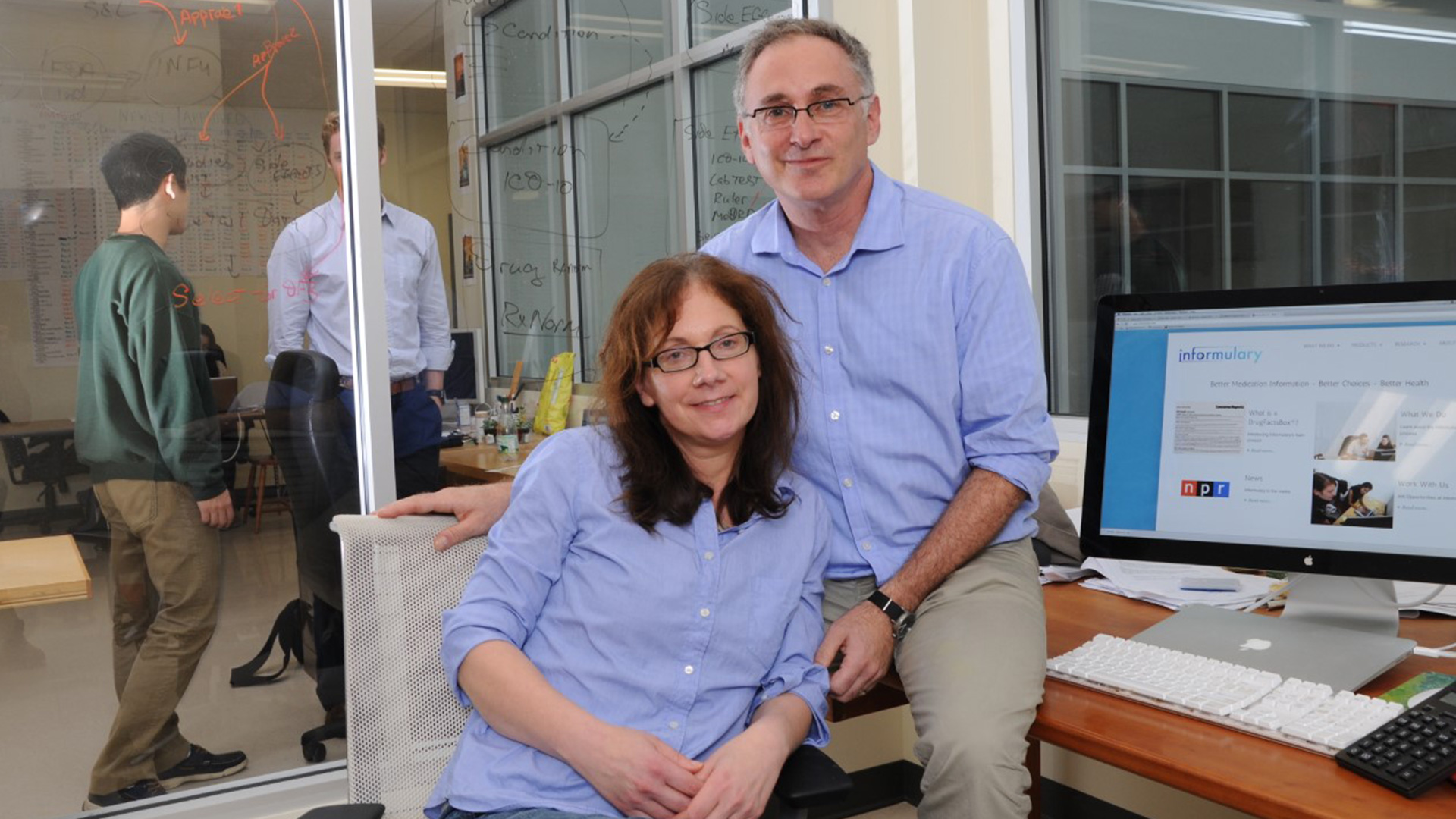Steven Woloshin, MD, MS, a professor of medicine and community and family medicine at Dartmouth’s Geisel School of Medicine, co-director of the Master of Health Care Delivery Science program at The Dartmouth Institute for Health Policy and Clinical Practice, and member of the Dartmouth Cancer Center’s Cancer Population Sciences program, has received the John E. Eisenberg Award for Practical Application of Medical Decision Making Research from the Society for Medical Decision Making (SMDM).
The award honors his work with Lisa Schwartz, MD, MS, his wife and research partner whose pioneering research helped improve the communication of medical information to physicians, policy makers, media, and the public. Tragically, professor Schwartz died in 2018.
The prestigious award is given each year to an individual or organization that has shown sustained leadership in translating medical decision making research into practice, and that has taken exceptional steps to communicate the principles and/or substantive findings of medical decision making research to policy makers, clinical decision makers, and the general public.

Founded in 1979, the SMDM is the leading international society for studying and advancing decision sciences in health, including incorporation of patients’ values and preferences. Its mission is to improve health outcomes by advancing proactive systematic approaches to clinical decision making and policy formation in healthcare—by providing a scholarly forum that connects and educates researchers, providers, policy makers, and the public.
“I’m thrilled and feel really honored to receive this award. The best thing about it is it recognizes the work that Lisa and I did together, which I am trying to continue,” says Woloshin.
“It’s very nice to be recognized by peers and experts in the field, many of whom have been mentors to me and Lisa—people like Hal Sox, Baruch Fischhoff, Jack Wennberg, Anna Tosteson, and Gil Welch,” says Woloshin, who received the award this week at the society’s annual meeting in Seattle, Washington.
“And I’m particularly happy that the award is for practical application of research,” he says. “Helping to improve the way people understand medical evidence and their ability to make good decisions has been our goal all along.”
To this end, Schwartz and Woloshin’s work has focused on two main areas—improving the quality of messages presenting health information to people and preparing audiences to make sense of the messages they receive. Their research themes have included: the science of risk communication, prescription drugs, medicine in the media, overdiagnosis, and the marketing of medicine.
Schwartz and Woloshin have done pioneering work in the field of health-related numeracy (quantitative literacy) in medicine, developing one of the first numeracy assessment tools. They wrote Know Your Chances, a widely praised book that helps people understand health messages and the evidence and numbers behind them. The National Library of Medicine selected the book for their “bookshelf” where it is available for free to the public. They also developed the Know Your Chances website for the National Cancer Institute which puts health risks into context to support discussions and decisions around actions to mitigate risk.
To more effectively convey information about the benefits and harms of prescription drugs, he and Schwartz created the Drug Facts Box which has been shown in clinical trials to improve consumer decision making. The innovative tool has been endorsed by the FDA’s Risk Communication Advisory Committee, the UK Academy of Medical Sciences, and the Council of Canadian Academies.
For more than a decade, he and Schwartz led the award-winning Medicine in the Media workshops with the NIH, teaching over 500 health journalists how to interpret and report on medical research (the workshops were recently restarted with support from Arnold Ventures). They also conducted some of the first studies on the effectiveness of press releases, documenting the strong relationship between the quality of releases and the quality of subsequent news stories. Woloshin is currently working to develop a set of guidances for press officers.
Schwartz and Woloshin’s research has played an important role in identifying and communicating about overdiagnosis (finding a disease or condition that would not have caused harm if undiscovered) and trying to mitigate its harms.
They co-authored Overdiagnosed, a critically acclaimed book on the topic, and Woloshin recently convinced the National Library of Medicine to add Overdiagnosis (with his definition) to its medical subject headings.
Most recently, Woloshin published two widely read papers during the pandemic which addressed issues and limitations related to COVID testing.
Woloshin is a founding member of the international Preventing Overdiagnosis organization (Schwartz was also a co-founder), serves on the editorial boards of JAMA Internal Medicine and the Cochrane Library, and is a collaborator in Informed Health Choices, an international effort working with schools to help children and young adults develop critical thinking skills. He also serves as co-director of the Center for Medicine and Media at The Dartmouth Institute.
Founded in 1797, the Geisel School of Medicine at Dartmouth strives to improve the lives of the communities it serves through excellence in learning, discovery, and healing. The Geisel School of Medicine is renowned for its leadership in medical education, healthcare policy and delivery science, biomedical research, global health, and in creating innovations that improve lives worldwide. As one of America’s leading medical schools, Dartmouth’s Geisel School of Medicine is committed to training new generations of diverse leaders who will help solve our most vexing challenges in healthcare.